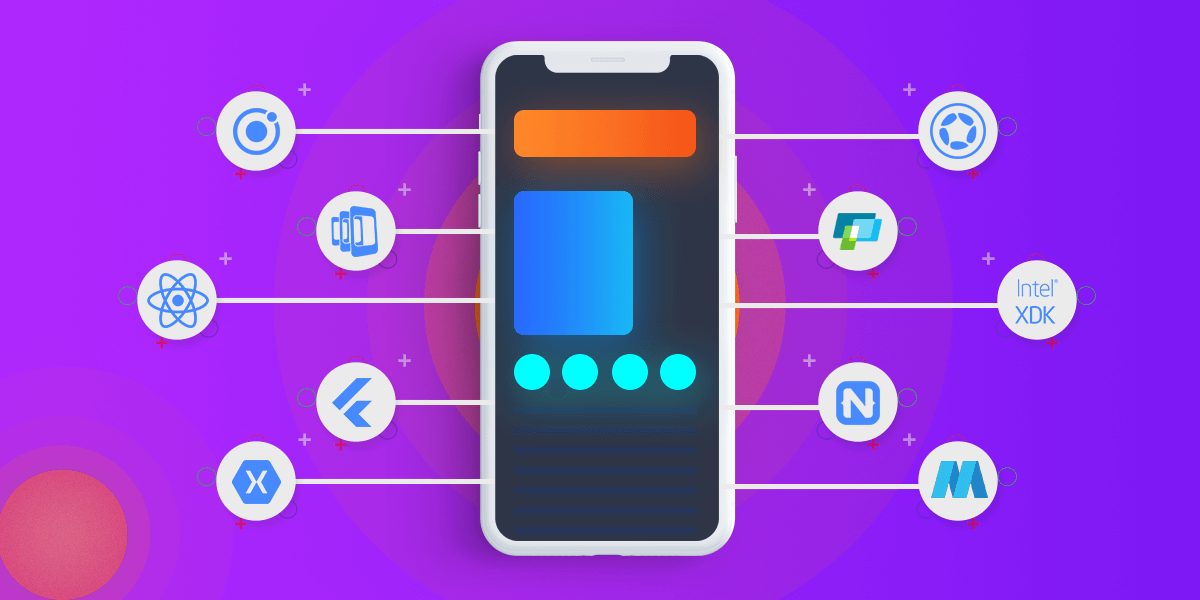Top Mobile App Development Frameworks in 2023
- Mobile
- December 3, 2018
There has been a paradigm shift in implementing the rightful business strategies. Most enterprises are switching from desktop websites to mobile applications, which is a fast-track passage to reach the targeted audiences.
However, the mobile app industry is also going through one of the most competitive phases where the selection of the right framework along with an apt platform and development strategy becomes pivotal.
Over the years there has been a steady increase in the number of programming languages for both Android as well as iOS Operating Systems.
In fact, the cross-platform app development has also gained momentum and one can certainly credit the best of the frameworks for this major transformation.
The frameworks also play a crucial role in converting an Android app into an iOS app and vice-versa.
Top Mobile App Development Frameworks in 2023
Let’s have a look at some of the popular mobile app development frameworks that will become a major tool for the developers in 2023.
1. React Native
It is one of the other popular cross-platform frameworks that have been launched by social media king Facebook.
Although it made its inception in 2013, it has become one of the preferred choices for the mobile app developers.

React Native is basically an open-source framework offering ample support to the IDEs and the other mobile app development tools.
It is supposed to be one of the optimal JavaScript frameworks for creating native apps for both Android and iOS platforms.
Read also: What Makes React Native the Future of Hybrid App Development?
2. Flutter
Flutter was launched by Google and is an open-source mobile application development SDK. It is a popular cross-platform app development and is written in the Dart language.

However, when it comes to the choice of framework, Flutter is best suited for the development of the hybrid apps. It makes use of the 2D rendering engine called Skia to develop the visuals.
The visuals resemble like the Material Design and Cupertino style. It is also much easier to test your project in Flutter. You don’t have to restart your project if there is any mistake.
Read also: Why Should Startups Choose Flutter for Mobile App Development?
3. Ionic
Ionic is one of the widely used frameworks employed for the development of mobile apps. What’s more interesting to note is that it is free of cost.
It is usually a client-side framework that helps in building native-based apps with a combination of HTML, CSS3, and JavaScript.

The Ionic framework also supports the latest mobile devices and prepares a robust ground for the mobile app before its final launching in the market.
The element of HTML5 helps in building hybrid apps as well. There is no doubt that it is regarded as one of the best assets for the development of the Progressive Web Apps.
4. Xamarin
Software Giant Microsoft introduced Xamarin, which is based in San Francisco. For making the best use of the Xamarin, the developers must learn to carry out the C# codebase and develop useful apps for Android, iOS, and Windows.
You can even share these codes with the help of Windows and Mac OS platforms. Since it allows the benefit of code sharing, the developers can save a lot of their time.
5. Adobe PhoneGap
If there is any alternation or change in the mobile app development, you can view it instinctively with the PhoneGap.
This is yet again a cross-platform app development framework using which the developers can develop apps in JavaScript, HTML5, and CSS. In case, you are planning to develop a hybrid app, it should top your priority list.
This amazing framework is not only offering best-in-class performance but also offers the freedom to the developers so that they can work without any hardware restrictions.
It can develop apps for almost all the major Operating systems in addition to Android and iOS. You also have the leverage to add more functionality with the addition of plugins.
6. Corona SDK
Corona SDK is ten times quicker as compared to the other mobile development frameworks. One of the important aspects is that is supported by Lua, a light-weight programming language that offers speed, ease of usage and flexibility to develop apps.
So, if you have to code at a good speed without comprising the app quality, then this is your choice. Moreover, it is also free and supports Windows and Mac OS as well.
7. JQuery Mobile
The jQuery is an HTML5 based development framework. One of the facts that make it unique is that it can run across all the devices with just a single code version.
You can use this framework to built both mobile apps as well as websites and get extensive supports for all types of operating systems including Windows, Mac OS, Blackberry, Firefox, and Kindle etc.
You can download the jQuery version in two variants; as a customized framework or the latest stable version. This readily shows that its popularity and demand is surging higher with faster app development in combination with the plugins.
8. Intel XDK
This is also a cross-platform mobile app development framework that can help in creating meaningful apps with the presence of plugins. You can develop responsive and interactive apps for all devices.
It also makes the task of testing, debugging and emulation easier apart from developing the app. The Intel XDX framework also supports the futuristic technologies such as IoT and popular framework like Node.js.
You also get the advantage of previewing your project live if you are making any changes. You also get the option of drag and drop to develop the apps despite getting unwanted codes.
9. Native Scripts
This has been ranked as the top frameworks for the development of the hybrid apps. Telerik, a Bulgaria based software company, which supports this framework and the creator is Progress.
The apps using the Native Scripts utilize the same APIs similar to using Xcode or the Android Studio. You will get sufficient help in the form of tutorials from the official website.
10. Mobile Angular UI
The Mobile Angular UI combines the implementation of the Bootstrap and Angular framework. It simplifies the process of development and you can build the apps using HTML5.
The developers can also make use of fastclick.js and overthrow.js offering a seamless experience. This is a free framework.
To learn more about mobile app development trends, best practices, mistakes to avoid, development phases, and more, read our comprehensive mobile app development guide.
Conclusion
The frameworks are the most important driving tools for building any mobile or web application. It must be remembered that every project or app has a different requirement and so the choice of the framework must be made carefully and after ascertaining the other essential factors.
This year, we will see the emergence of many popular frameworks but these will top the priority list of the developers.
If you want to know more about mobile app development frameworks and which framework is best for your mobile app ideas then contact us now. Our expert team will guide you that will help to grow your business.














